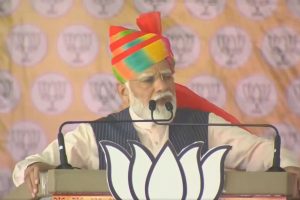The spirit of public service, particularly to the poor and marginalised, is virtually extinct. The police has become alienated from the public. It functions as the police of the ruling party, and not the people‘s police. Upright officers, with spine, are asked to cool their heels in inconsequential postings, with little work to do. Politicisation has snapped the chain of command and control, corroded discipline, and made the police leaders beholden to the politicians of the ruling party.
The Indian Police Service is almost facing an existential crisis. Its officers are being denounced by the people, the media and political parties. The failures of the police brass are trumpeted, and as often as not successes go unnoticed. The IPS is one of the three All-India services of the Government of India. It replaced the Indian Imperial Police (IP) in 1948, a year after Independence. Members of the service are selected on the basis of a civil services exam conducted by the UPSC.
During British rule, the Indian Civil Service and Imperial Police were viewed with distrust, bordering on revulsion by the political leaders. They were criticised as collaborators of the foreign masters. After Independence, many political leaders were of the view that the civil services had outlived their utility, and should be scrapped. Fortunately, independent India’s first Home Minister, Sardar Patel, was a visionary and a man of practical wisdom. He had realised that to hold onto the country, just after attaining Independence, and resist the forces of disintegration and chaos, there was need for a well-trained, efficient and effective civil and police service. If senior officers could work for the foreign powers effectively, there is no reason as to why they should not serve the country with matching seriousness of purpose. Even before Independence, he had persuaded the Congress to agree to the continuation of the two All-India services. He said: “The Union will go if you do not have an All-India service, insulated from pulls and pressures, and with independence, to speak out its mind.” Recruitment must be conducted, he argued, through the Union Public Service Commission. By implication, this meant through Article 311 of the Constitution. The present strength of the Indian Police Service is around 5000. The officers are on the whole bright, alert and qualified young men and women. Though the minimum qualification is a graduation degree, many of the entrants are far more accomplished. During the past two decades, doctors, engineers and management graduates have joined the service, and added to the talent pool. David Bayley, an internationally renowned police scholar, was so impressed by the calibre and competence of IPS officers that he wrote in his book, Police and Political Development in India that “to talk to an IPS officer is to talk to an educated man and political development in India. I do not believe that an American school graduate, or a college graduate will show up as well.”
Initially, women were loath to join the Indian Police Service in view of the prevailing perception that the service is meant for tough muscular men, and women would not be able to cope with the arduous nature of the job. That myth was exploded by Kiran Bedi, the first woman to join the IPS. A battering ram, she broke the walls of the male fortress, and subsequently inspired many young women to opt for the IPS. In terms of commitment, many of them have performed better than male counterparts.
For senior police leaders, the first few years after Independence were relatively smooth and trouble-free. Unfortunately, problems and challenges affecting law enforcement and good governance soon surfaced. This happened largely due to the decline in the quality and probity of the political masters, and their lack of vision. During the early years of Independence, the politicians at the helm of governance were learned, committed and sensitive, and with respect for rules and norms. There was no brazen interference in such matters as transfers and postings. I had the opportunity to work with Chief Ministers, who would show respect to senior officers and listen to their views before issuing any peremptory orders. They were not guided by narrow partisan considerations. But in due course of time, political masters began to assert themselves, resulting in brazen political interference in police operations. Police leaders also abjectly capitulated and carried out the dictates, at times illegal and irregular, of the politicians. This transformed the police into defenders of the establishment, and not upholders of the rights of the people. The spirit of public service, particularly to the poor and marginalised, is virtually extinct. The police has become alienated from the public. It functions as the police of the ruling party, and not the people’s police. Upright officers, with spine, are marginalised and asked to cool their heels in inconsequential postings, with little work to do. Politicisation has snapped the chain of command and control, corroded discipline, and made the police leaders beholden to the politicians of the ruling party.
Allegations of corruption have tarnished the image of the IPS. When I joined the service, there were few dishonest officers, both in the IAS and IPS. Over the years, there has been a dramatic change in the overall situation. Many IPS officers are facing charges of corruption. And they include young officers with three to four years of service. For insulating the police from extraneous pressures, and implementing the core recommendations of the National Police Commission, the Supreme Court issued a number of directions in Prakash Singh’s case. Ten years have rolled by, but almost all the states, through various strategies and subterfuges, have evaded implementation of the instructions. Nor for that matter has the Supreme Court cracked the whip.
There is also another disconcerting issue. Is the Indian Police Service becoming irrelevant? In the states, the political masters feel more at home with state police service officers, and are not in favour of posting IPS officers in their States. This is a dim, short-sighted and opportunistic view.
Despite criticisms and controversies, the fact remains that bright, well-educated IPS officers, with wider vision and perspective, have added value to the service and enhanced its standing. They have also functioned as a link between the state police and central police forces. In a bewilderingly diverse country like India, with inherent shortcomings, their role in law-enforcement has been of cardinal importance. Many IPS officers have been rewarded for their outstanding performance in difficult and challenging circumstances. Many others have introduced innovative changes in police operations. Those IPS officers, who have done a stint at the Centre, can boast a rich and varied experience, which can invigorate police administration in the states.
But unfortunately, matters are drifting and the trends are ominous. Unless certain meaningful steps are taken to reverse the trend and importance of the service is acknowledged, there is a distinct likelihood that the Indian Police Service, whose role is not appreciated either by the political masters or the public, will outlive its utility and relevance, and slide into oblivion.
(The writer is Senior Fellow, Institute of Social Sciences; former Director-General, National Human Rights Commission, and former Director, National Police Academy)











